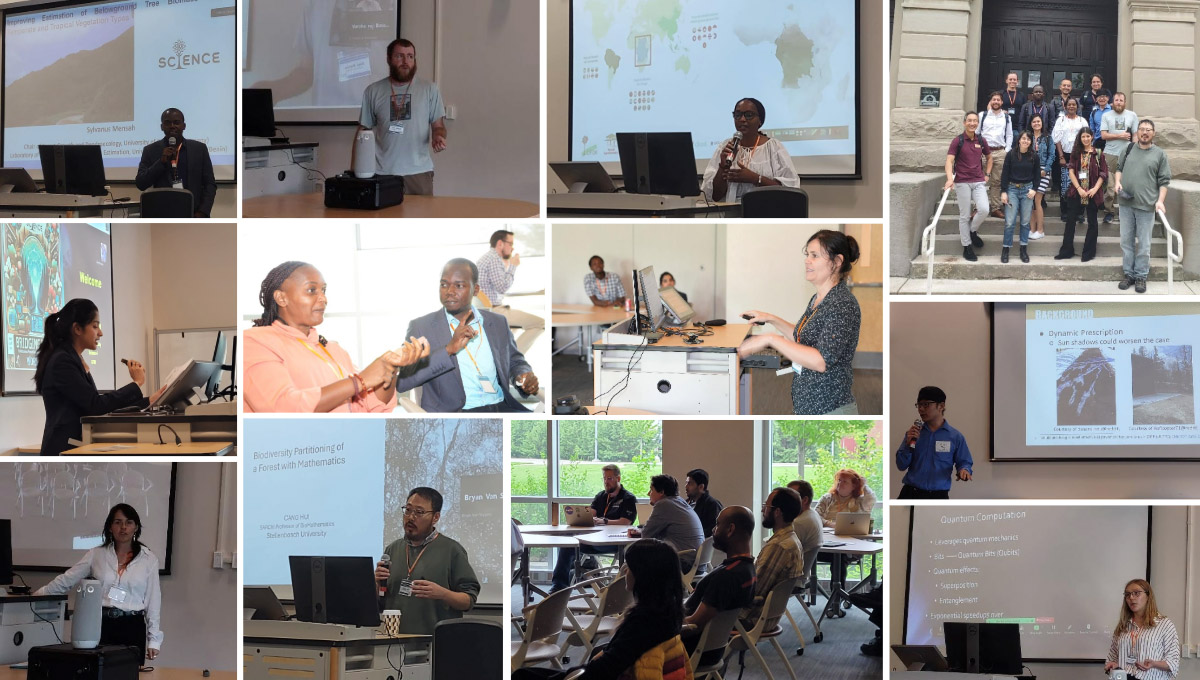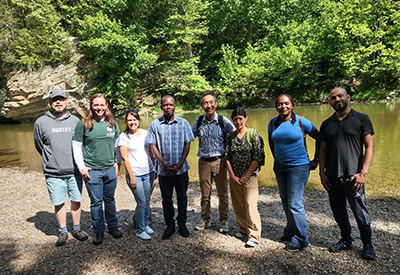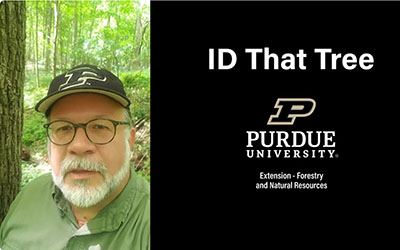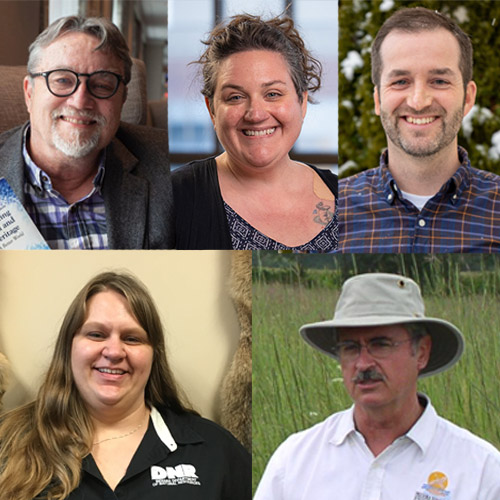Science-i Bridging Worlds Workshop Facilitates Strategic Partnerships, Collaboration on Global Forest Issues
Researchers from across the globe traveled to Purdue for the Science-i Bridging Worlds Workshop, May 6-7, with the goal of fostering a community focused on forest management, especially relating to the critical challenges confronting global forests due to climate change impacts and complex ecosystem interdependencies. The workshop emphasized international collaboration, innovation and the use of advanced technologies to drive impactful solutions.
“The key objectives were to bridge data access gaps, advocate for sustainable forest management practices and amplify the voices of marginalized communities, including indigenous groups,” said Dr. Jingjing Liang, the event organizer and an associate professor of quantitative forest ecology. “Strategic partnerships, access to advanced cyberinfrastructure and commitment to collaborative knowledge creation were central to the workshop’s approach. Participants were not only successful in attaining these overarching goals highlighting diversity, data accessibility and cutting-edge technology, but they left the workshop encouraged to leverage available resources and engage in ongoing communication and collaboration moving forward.”
The 70 participants hailed from 22 countries, with many representing populations from the Global South and indigenous communities. Several also were early-career researchers.
Ahead of the workshop, researchers worldwide were invited to submit proposals for projects that would impact both their local forests and those on the other side of the globe to the Global Big Ideas Competition. Ten projects were selected to be featured as part of the workshop, with awardees receiving funding through the National Science Foundation to travel to Purdue for the workshop.
Featured projects included:
- ZetaForests: Unravelling Global Forests Turnover and Co-Occurrence – Sandra MacFayden, Stellenbosch University, South Africa
- Adapting Trees: Ecological Strategies in a Changing Climate – Gabriel Yan Rosa, FURB – Universidade de Blumenau, Brazil
- Automating Large-Scale Site-Specific Solar Resource Maps – Yaguang Zhang, Purdue University Agriculture and Biological Engineering (ABE) and Agricultural Sciences Education and Communication (ASEC)
- Phylogenetic diversity-productivity relationships at the global scale – Erhan Huang, Peking University, China
- Improving Estimation of Belowground Tree Biomass Across Temperate and Tropical Vegetation Types – Sylvanus Mensah, University of Freiburg, Benin
- Prioritizing Forest Cover Restoration Opportunities in West Africa: Strategies for Natural Regeneration, Agroforestry and Plantation – Amani Bienvenu and Hippolyte Konan, Cote d’Ivoire. *unable to attend
- Compare the Carbon Storage of Urban Forests with Natural Forests – Chenqi He, China. *unable to attend
- Safeguarding High Integrity Tropical Forests Using Translational Science – Emilio Vilanova, Wildlife Conservation Society, Venezuela
- Multiple Disturbances Impacts on West African Tree Species Abundance – Irie Zo-Bi, Cote d’Ivoire *unable to attend
- Forest Remote Sensing Data Analysis Using Quantum Edge Detection – Vivian Sattler, Leibniz University Hanover, Germany
“The Bridging Worlds workshop was an excellent platform for gathering diverse global expertise to develop innovative ideas that foster a collaborative spirit essential for addressing various challenges in forestry research,” Dr. Sandra McFadyen said. “I am very grateful for the opportunity to be involved. I gained invaluable insights into the latest advancements in forest management and biodiversity conservation and formed meaningful connections with researchers from around the world, which I believe will significantly enhance our collaborative efforts in the zetaForests project. The workshop has broadened my perspective on the potential of digital forestry and reinforced the importance of leveraging advanced technologies and international collaborations to tackle global environmental issues.”
 A collage of images from the Science-i Bridging Worlds Workshop. Top row (Left to Right): Dr. Sylvanus Mensah; Alex Mehne; Dr. Florence Palla; workshop attendees stand in front of Pfendler Hall on campus at Purdue. Row 2 (L to R): Anika Mitra; workshop attendees Florence Palla (OFAC) and Sylvanus Mensah (University of Freiburg) participate in a discussion at the event; Dr. Sandra MacFayden; Dr. Yaguang Zhang. Row 3 (L to R): Liz Kimbrough; Dr. Cang Hui; workshop attendees listen during a presentation; Vivian Sattler.
A collage of images from the Science-i Bridging Worlds Workshop. Top row (Left to Right): Dr. Sylvanus Mensah; Alex Mehne; Dr. Florence Palla; workshop attendees stand in front of Pfendler Hall on campus at Purdue. Row 2 (L to R): Anika Mitra; workshop attendees Florence Palla (OFAC) and Sylvanus Mensah (University of Freiburg) participate in a discussion at the event; Dr. Sandra MacFayden; Dr. Yaguang Zhang. Row 3 (L to R): Liz Kimbrough; Dr. Cang Hui; workshop attendees listen during a presentation; Vivian Sattler. In addition to the research talks from the Global Big Idea winners, the workshop featured sessions on topics ranging from science innovation from a journalist’s perspective to economic thinking for ecologists and conservationists, nature-based solutions to the climate crisis and biodiversity.
Keynote speakers included:
- Javier Gamarra, International Consultant on Forest Statistics at the Food and Agriculture Organization of the United Nations – Topic: Innovation in Forest Research Talks to Politics
- Liz Kimbrough, staff writer at Mongabay – Topic: Science Innovation from the Perspective of a Journalist
- Meredith Bastian, recruiting editor and member of the committee on Diversity, Equity and Inclusion at the Proceedings of the National Academy of Sciences (PNAS); Topic – From Ideas to Publications
- Mo Zhou, professor of forest economics and management, Purdue University; Topic – The Economic Way of Thinking for Ecologists and Conservationists
- Peter Reich, professor and director of the Institute for Global Change Biology at the University of Michigan; Topic – The Promise and Pitfalls of ‘Nature-Based Solutions’ to Our Climate Crisis
- Bryan Van Stippen, program director for Indian Land Tenure Foundation and the National Indian Carbon Coalition; Topic – Nature-Based Solutions on Indigenous Land
- Cang Hui, mathematical ecologist at Stellenbosch University; Topic – Biodiversity Partitioning of a Forest with Mathematics
- Florence Palla, coordinator of the RIOFAC project at the Central African Forest Observatory in Cameroon; Topic – Biodiversity Conservation in Africa
“The workshop called Bridging Worlds connected researchers from all over the world with different areas of expertise, synchronized in a common goal for the conservation of forests on the planet,” said Nava Miranda, a PhD student at Universidad de Santiago de Compostela who works at the Universidad Juarez del Estado de Durango. “The enormous task of understanding and providing solutions to current environmental problems is not an easy task, therefore, a multidisciplinary work team is necessary to: 1) generate data, 2) propose ideas, 3) analyze trends, 4) publish the information, 5) apply strategies for society to implement scientific discoveries. This arduous process is necessary to plan a sustainable future, and thanks to new technologies it is possible to do it on a large scale. Each member is part of a group of efforts that must be made known to the world.
“I already knew the work of many of the researchers who attended the event, however, having the opportunity to live the experiences and listen to their ideas has been enriching in every way. I also have met many new and interesting people and we will continue to (stay in) contact.”
Outside of the workshop talks, attendees had the opportunity to tour the Purdue campus and learn about the university’s facilities and research capabilities. An optional field trip to Turkey Run State Park gave visitors a chance to enjoy a scenic hike and explore the park’s biodiversity and ecological significance, while also gaining an understanding of the geological drivers of biodiversity in the central hardwood forests.
“Through efforts like the Global Big Ideas Competition and Bridging Worlds Workshop, we are doing our part to help Purdue University evolve into a global nexus, weaving together local communities, nongovernmental organizations, research institutions and governments worldwide to confront and tackle the pressing environmental challenges of our time,” Liang said.
The workshop was made possible in part by a National Science Foundation grant (#2311762) and was co-hosted by Science-i and the Forest Advanced Computing and Artificial Intelligence (FACAI) laboratory at Purdue, with help from the Purdue Institute for Sustainable Future and the Purdue Institute for Physical AI.
Liang's full recap of the workshop, speakers list and outcomes is available in PDF format on the Science-i website.
Science-i is a transparent and FAIR (Findable, Accessible, Interoperable and Reusable) web platform and research hub hyper-converged with earth-observation data, global expertise, and advanced cyberinfrastructure to accelerate science, by empowering underrepresented communities in global research and knowledge co-production. Science-i promotes customizable data-sharing policies and collaboration tools and boasts the world’s largest biodiversity database and is home to the largest global forest research community. The Science-i community includes more than 400 experts from 57 countries spanning areas of expertise ranging forestry to ecology, applied ecology, environmental sciences, ecological methods and plant sciences.
The FACAI lab stands at the forefront of integrating advanced computing and AI techniques into forest ecosystem studies and aims to significantly advance understanding of global forest diversity. Due to its robust global partnerships, FACAI operates with a unique asset, a comprehensive in situ forest inventory database spanning multiple continents. FACAI has significantly contribute to forest ecosystem studies, particularly though its connection with the Global Forest Biodiversity Initiative (GFBI). A key achievement is the collaborative and groundbreaking project to estimate the total number of tree species worldwide.






